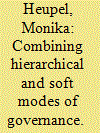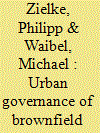| Srl | Item |
| 1 |
ID:
080899


|
|
|
|
|
| Publication |
2008.
|
| Summary/Abstract |
In the wake of 9/11, the UN Security Council (SC) set out to urge every UN member to strengthen its domestic capacity to counter transnational terrorism and the heightened risk of weapons of mass destruction (WMD) proliferation to non-state actors. This article examines the modes of governance the SC applied - in terms of both setting and implementing rules - to influence states' activities in response to these two security threats. The far-reaching, generic, legally binding obligations imposed on every UN member were unprecedented and indicate a `hierarchical' approach. Yet, the SC - partly deliberately, and partly out of necessity - drew extensively upon a range of `soft' governance modes to support implementation and enhance the legitimacy of its approach. It remains to be seen whether this approach will be the precursor to a future trend. However, its usefulness will depend on whether the SC members will come to an agreement on how to implement `legislative' resolutions, and whether non-Council members will be granted greater influence in SC decision-making. Although more empirical research is needed on the SC's application of different modes of governance, these results contribute to a better understanding of the use of governance modes by international organizations other than the European Union
|
|
|
|
|
|
|
|
|
|
|
|
|
|
|
|
| 2 |
ID:
176603


|
|
|
|
|
| Summary/Abstract |
Drawing on insights from recent economic theories of incomplete contracts, we develop a theoretical model on authority relationships in the Chinese bureaucracy by conceptualizing the allocation of control rights in goal setting, inspections, and provision of incentives among the principal, supervisor, and agents. Variations in the allocation of these control rights give rise to different modes of governance and entail distinct behavioral implications among the parties. The proposed model provides a unified framework and a set of analytical concepts to examine different governance structures, varying authority relationships, and the specific principal-agent problems entailed in a bureaucratic setting. We will illustrate this through a case study of authority relationships and ensuing behavioral patterns in the environmental protection arena over a five-year cycle of policy implementation.
|
|
|
|
|
|
|
|
|
|
|
|
|
|
|
|
| 3 |
ID:
144847


|
|
|
|
|
| Summary/Abstract |
Over the past several years, the creative reuse of brownfields has played a major role in Chinese cities to give their urban landscape a so-called second development. This paper analyses the governance of the brownfield restructuring in Guangzhou (Canton). The research is based on a study of the T.I.T Creative Industry Zone, a highly successful creative space currently in danger of demolition. This paper follows DiGaetano and Strom's (2003) analytical governance framework. This approach allows for deciphering the complexities of decision-making through a well-structured set of interdependent categories. In Guangzhou, new policies and institutions have been promoting the restructuring and have contributed to the formalisation of public–private interactions. In general, this indicates a shift towards a more corporatist governance. However, the study of T.I.T reveals a rather intricate picture: the policymaking remains influenced by a top-down authoritative style – sometimes in an arbitrary manner – and to some extent also by particularistic exchanges. This indicates a complex mode of urban governance consisting of increasingly corporatist elements but still with managerial, and to a lesser extent, clientelistic elements. Finally, the coexistence of different governance modes seems to be a typical outcome of China's transition while still remaining more adaptive, experimental and flexible in nature.
|
|
|
|
|
|
|
|
|
|
|
|
|
|
|
|